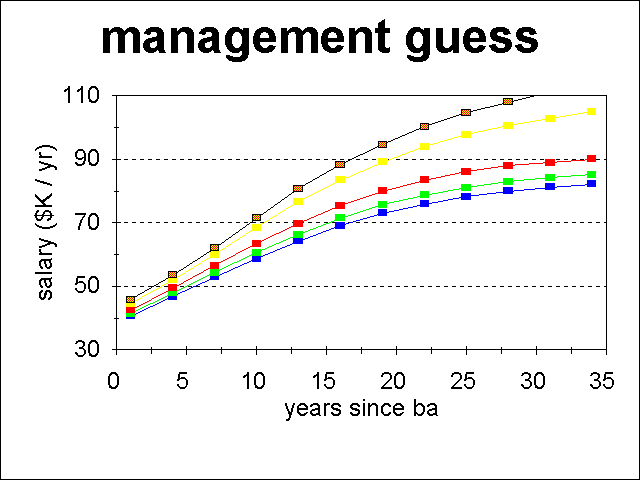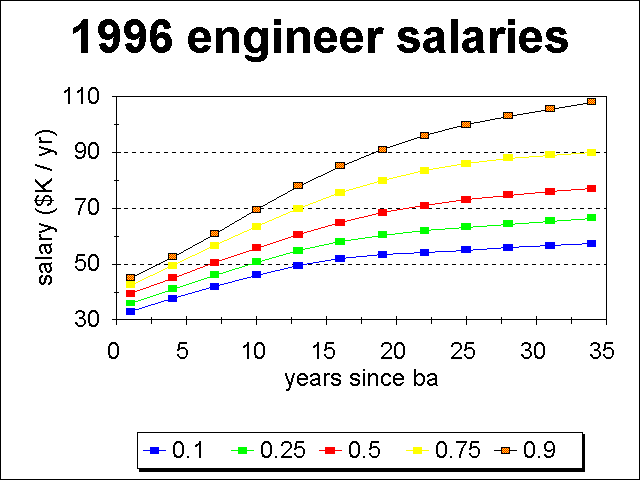
(Click on graph for bigger and better image.)

(Click on graph for bigger and better image.)
The answer, of course, is yes, they had better by paid more on average, or something is wrong. But the reason behind it is probably not what you think, and you may be surprised to learn that:
Dilbert aside, in the best of all possible worlds, you don't pick your managers from your most incompetent employees! Granted, sometimes that may happen, and I personally have had bosses and seen other supervisors that definitely didn't come from the most competent half of all employees, but it is the exception rather than the rule. You promote someone to management because they have done well at their current job, which directly implies that their current salaries, before promotion to management, are in the top half of the salary curve.
For this analysis, I assume exactly that management comes from the upper half of the salary curve distribution, with the average salary at the 75th percentile and a spread going down to the 50th percentile and the same spread above the 75th percentile. Specifically, since the exact numeric values don't really matter to illustrate the point, I assume that:
Then the management salary curve for the 10, 25, 50, 75 and 90th percentile distributions becomes something close to the curve on the left below, with the non-management engineer salary curve remaining virtually identical to the all engineer salary curve on the right below (since management is a small percentage of all engineers):
 (Click on graph for bigger and better image.) |  (Click on graph for bigger and better image.) |
Note carefully the implications of this - even though the management salary curve here is significantly higher than the overall engineer salary curve, because of the way I constructed it, management salaries are exactly identical to overall engineer salaries!
Also, both of the "surprising" factors listed at the top are true here: lower-rated supervisors often hand out raises to employees that are higher than theirs, and many of their employees have salaries higher than they do.
Of course, if the boss of Dilbert's boss felt he was doing a good job as a supervisor, he would make sure that Dilbert's boss had a salary appropriate to the management salary curve. That travesty would then be justly claimed to be an injustice, and that boss is earning a higher salary "simply because he is in management". Hey, the world isn't perfect.
There is of course another reason that makes management salaries even higher for those supervisors who are good at their job: the old (by now to you) economic value argument. Supervisors are in a position to influence the economic output of their companies much more than nonsupervisors. If supervisors perform well, they can motivate their employees and cause their unit to produce more widgets, or programs, or satellites, or whatever, which causes their company to be more successful and obtain more revenue. Thus good supervisors must be rewarded over and above their position on the overall engineering salary curve. If a particular company didn't reward them accordingly, another company would very willingly steal that supervisor away by offering more money.
There are cases where the economic value sometimes doesn't exist, such as perhaps being a Department Chair in some Universities. In those cases, people must have their arms twisted to take up temporary duty as a manager, and they receive "hazardous duty pay" to compensate them for the extra grief that their job entails.
You can even imagine some cases in which there is no economic value to being a supervisor, but because some people enjoy the perceived power of that position, the supply of candidates might be such that those supervisor positions would pay less than the equivalent nonsupervisor salary curve would. This is pretty unlikely, if only because it is management that in the end decides on salaries, a somewhat incestuous position. (Much like the bad situation companies have gotten into today where the CEO essentially sets their own salaries.)
Supervisors who are not suited to their management job, on the other hand, get lower raises than they would have received had they stayed away from management. The usual result is of course that the employee eventually decides that management is not for them, and they go back to being an above-average nonsupervisor.
Go To:
Copyright © 1997 by Tom Chester.
Permission is freely granted to reproduce any or all of this page as long as credit is given to me at this source:
http://la.znet.com/~schester/calculations/salaries/management_salaries.html
Comments and feedback: Tom Chester
Last update: 25 September 1997.